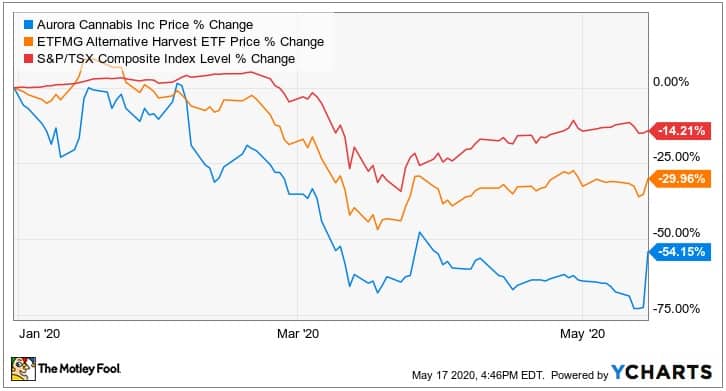Leading Canadian cannabis stock Aurora Cannabis (TSX:ACB)(NYSE:ACB) gained a startling 42% in a week. This sharp gain, which is greater than many stocks deliver in one year, underscores the considerable volatility of marijuana stocks. Even after that rally, Aurora is still down by a whopping 54% for the year to date — that’s almost double the 30% decline of the industry’s largest ETF ETFMG Alternative Harvest ETF.

There are still headwinds ahead for Aurora, indicating that it’s not as appealing as some investors believe.
Aurora’s improved results
Aurora’s latest fiscal third quarter 2020 results are responsible for fueling the sudden spike in value. Investors reacted positively to the numbers sparking claims that the worst is over for the beleaguered cultivator.
Aurora’s net revenue shot up 35% compared to the previous quarter, most of which was driven by a 125% spike in international medical cannabis revenue.
Notably, adjusted EBITDA shot-up by 37% to a little less than negative $51 million.
These improved numbers can be attributed to a 34% quarter over quarter increase in cannabis sold to 12,729 kilograms. Aurora is a low cost cultivator reporting cash costs of $0.85 per gram produced, which was $0.03 per gram lower than the previous quarter.
For these reasons, it’s easy to understand the considerable enthusiasm which has buoyed Aurora’s stock.
While those numbers certainly represent a solid improvement for the beaten down cannabis stock, Aurora doesn’t deserve accolades from investors yet. The company is still bleeding red ink, reporting a $137 million third quarter loss, which, while lower than the $1.3 billion reported for the previous quarter, shows that Aurora is burning through cash.
Poor outlook for cannabis stocks
It is difficult to see Aurora becoming profitable anytime soon. The global legal cannabis market is not shaping up to be as big as industry pundits initially believed. Claims of up to US$500 billion appear preposterous, particularly with many analysts reducing their forecasts.
Grandview Research’s claim of a US$74 billion global legal marijuana market is unrealistic with some analysts predicting it could be as low as US$40 billion.
The rapid easing of marijuana laws, expected after Canada became the first developed nation to legalize recreational consumption, is not occurring. The stigma associated with marijuana’s use and concerns over health impacts, notably hospital admissions and vehicular accidents spiking in jurisdictions where social use is legal, are weighing on law makers.
The coronavirus pandemic, aside from causing forcing dispensaries to close in many jurisdictions, is distracting legislators from the legalization of marijuana.
The economic fallout from the pandemic has effectively made it impossible for cannabis companies to access credit, in an industry already starved of capital. Banks and other financial institutions are winding down lending activities and bulking up their cash reserves in response to an anticipated spike in credit losses.
That is bad news for cannabis companies like Aurora which are burning through cash at a furious pace.
Aurora’s weak financial position a concern
Despite highly dilutive equity raisings earlier this year, Aurora only had $230 million in cash on its balance sheet at the end of the third quarter. That is equivalent to around two quarters of losses based on the latest results. It is also $74 million greater than the almost $156 million drawn on Aurora’s credit facility maturing in August 2021.
More worrying is the inflated goodwill on Aurora’s balance sheet. Even after the previous quarter’s sizable write-downs, including $921 million for goodwill and intangible assets, Aurora still has a whopping $2.4 billion of goodwill on its balance sheet plus $500 million of intangible assets.
Goodwill and intangible assets compose an unbelievable 62% of Aurora’s assets. They are also an incredible three-times its market cap and more than double Aurora’s enterprise value. In an unproven industry facing considerable headwinds, this indicates there will be further write-downs and impairment charges.
Foolish takeaway
After a difficult year, Aurora’s current results offer a glimmer of hope for beleaguered investors. The ballooning optimism surrounding the cultivators outlook appear overbaked. There are certainly more asset write-downs and dilutive capital raising ahead.
Growing industry headwinds, overpriced assets and a lack of profitability makes Aurora an unattractive investment, even after the latest results.








